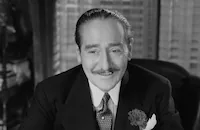Thanks for Everything
Brief Synopsis
Cast & Crew
William A. Seiter
Adolphe Menjou
Jack Oakie
Jack Haley
Arleen Whelan
Tony Martin
Film Details
Technical Specs

Synopsis
Bumbler Henry Smith of Plainville, Missouri learns that he has won the $25,000 Average Man Contest, which over three million Americans have entered. He immediately signs a contract to buy a house, purchases a car with money loaned by his girl friend Madge Raines's father Joe and presents Madge with a ring. Henry's answers to 99 of the 100 questions in the contest concerning his preference of food, clothes, consumer products and habits exactly match those of the "average man," as computed from the answers of all the contestants. Because of this, J. B. Harcourt, the president of the New York ad agency running the contest, decides to hire Henry and observe his reactions to various products, so that the agency's clients can predict if their new products will catch on with the public. When J. B.'s assistant, Kay Swift, points out that Henry's tastes may change after he receives the $25,000, J. B. schemes to have Henry disqualified and then offers him a position with the firm. Once Henry accepts, J. B. orders his assistant Bates, who is in love with Kay, to live with Henry and keep a record of everything he does. Soon J. B.'s new company, Guidance, Inc., has amazed the business world with its predictions based on Henry's offhanded remarks concerning new products. When the company announces that it is seeking the typical American girl for the upcoming New York World's Fair, Henry suggests Madge, and she is brought to the city as Miss World's Fair. Afraid that marriage will change Henry, Bates connives to keep him away from Madge. When Henry, in a depressed state, does absent-minded things like put ketchup in his coffee and shave with toothpaste, Kay realizes that Henry is lovesick, and she convinces J. B. to try to get him and Madge together again. However, just then, a European ambassador hires the company to predict the circumstances under which the average American would be willing to go to war. To begin their scheme to test Henry, J. B. sends Bates to take Henry to a Russian bath, and Bates arranges for Henry to be beaten with switches of poison ivy, so that he will have to be confined to a room. J. B. and Kay then arrange for Henry to receive phony newspapers and to hear fake radio broadcasts containing made-up incidents of growing international tension that appear to be real. Henry is adamant that the country should keep out of war until he hears on a broadcast that the Atlantic sea coast has been bombarded and hundreds have been killed. Finally Henry is aroused, feeling that American lives and democracy are endangered, and he leaves the room in a hurry, wearing only his pajamas, to enlist. After seeing homes wrecked, but not noticing a nearby wrecking company sign, Henry runs into a marine recruiting office, and they think he is crazy. Bates, also without his pants, is arrested as he chases Henry. After he is released, he finds Henry in a mental hospital, where the marines have taken him. The situation is straightened out, Henry is paid $100,000 for being a guinea pig and he is named "Man of the Year" by Time Magazine. He is reunited with Madge and given a "welcome home" parade in Plainville, during which he plays the clarinet and J. B. and Bates play the bass drum.

Director

William A. Seiter
Cast

Adolphe Menjou

Jack Oakie

Jack Haley

Arleen Whelan

Tony Martin

Binnie Barnes

George Barbier

Warren Hymer

Gregory Gaye
Andrew Tombes
Renie Riano
Jan Duggan

Charles Lane
Charles Trowbridge
Frank Sully
Gary Breckner
Paul Hurst

James Flavin
Ed Deering
Ruth Peterson
Arthur Rankin
John Dilson
Joe Twerp
Constantine Romanoff
George Du Count
Jack Pennick
Mary Gordon
Minerva Urecal
Fred Kelsey
Brewster Twins
Lillian Porter
Irma Wilson
Esther Brodelet
Jack Egan
Paul Kruger

Mary Healy
Crew
Lucien Andriot
Art Arthur
Harry Joe Brown
Alfred Bruzlin
Mack Gordon
Charles Hall
Roger Heman
Bernard Herzbrun
Curtis Kenyon
Mark-lee Kirk
Thomas Little
Harry Revel
Louis Silvers
Robert Simpson
Harry Tugend
Gwen Wakeling
Gilbert Wright
Darryl F. Zanuck

Film Details
Technical Specs

Quotes
Trivia
Notes
While there seems to be some similarity between events at the end of this film and the Orson Welles War of the Worlds radio broadcast of Halloween night 1938, the New York Times review states that "on the authority of Twentieth Century-Fox, than which there can be no greater, this inspiration preceded the Orson Welles hoax." A New York Times news item states that Zanuck decided on concluding the film with a "hoax war scare on the radio" some months before the Welles broadcast. A screenplay by Harry Tugend dated September 26, 1938 included in the Twentieth Century-Fox Produced Scripts Collection at the UCLA Theater Arts Library confirms that that scene with the phony radio broadcast was written before the Welles broadcast. Motion Picture Herald, in discussing this film's style, commented, "Coming within that style of pictures that began with Twentieth Century [see below] and has its latest demonstration in The Mad Miss Manton [], the story disregards anything that might be sane and sensible." According to Hollywood Reporter news items, Mack Gordon and Harry Revel originally wrote seven songs for the film, Herman Bing was signed to be in the cast and Frank Ryan was engaged to work on the script. In the Twentieth Century-Fox trade advertisement billing sheet, Bing's name and character role of "Mr. Schwitz" is crossed out. No other information has been located concerning his or Ryan's participation in the film.












